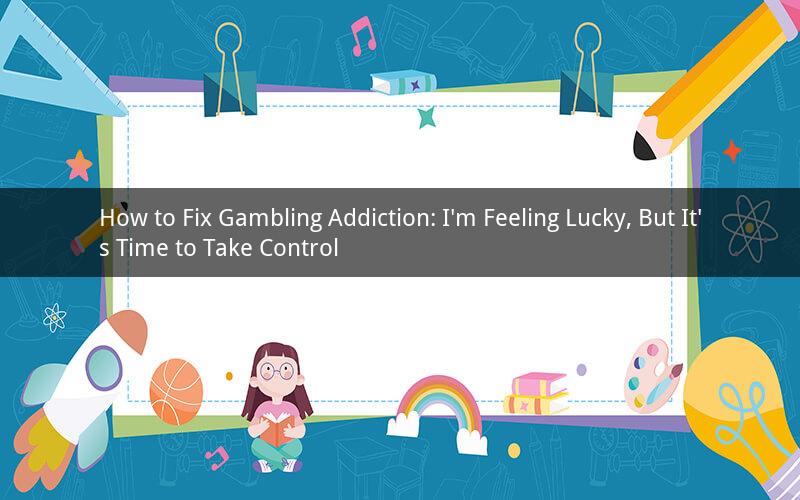
Gambling addiction, often referred to as a hidden illness, has been affecting countless individuals worldwide. Many people start with good intentions, believing they have the skill and luck to win big, only to find themselves trapped in a cycle of debt and despair. If you're struggling with gambling addiction and find yourself feeling "lucky," it's time to take control and address the issue. In this article, we will explore various strategies and resources to help you overcome your gambling addiction.
1. Acknowledge the Problem
The first step in overcoming gambling addiction is to admit that you have a problem. It's crucial to recognize the negative impact gambling has on your life, including financial, emotional, and social consequences. Remember, it's never too late to take back control of your life.
1.1 How can I identify if I have a gambling addiction?
To determine if you have a gambling addiction, consider the following signs:
- You often think about gambling, even when you're not doing it.
- You've tried to stop gambling, but you can't seem to control your urge.
- You've spent more money than you can afford on gambling.
- You've experienced relationship problems due to your gambling habits.
1.2 Why is it important to acknowledge the problem?
Acknowledging your problem is the first step towards recovery. It allows you to seek help and support from others, which is crucial in overcoming gambling addiction.
2. Seek Professional Help
Professional help can provide you with the necessary tools and support to overcome your gambling addiction. Here are some options to consider:
2.1 Therapy
Cognitive-behavioral therapy (CBT) has been proven effective in treating gambling addiction. A therapist can help you identify and change negative thought patterns that contribute to your gambling habits.
2.2 Support Groups
Support groups, such as Gamblers Anonymous, can provide you with a sense of community and understanding from others who have faced similar challenges. Sharing your experiences and receiving support can be incredibly beneficial in your recovery journey.
2.3 Inpatient or Outpatient Treatment
Inpatient or outpatient treatment programs can offer structured support and therapy tailored to your specific needs. These programs often include individual therapy, group counseling, and educational workshops.
3. Create a Support System
A strong support system can help you stay on track during your recovery journey. Here are some ways to build a support network:
3.1 Communicate with Loved Ones
Openly discuss your gambling addiction with your family and friends. They can offer emotional support and hold you accountable for your actions.
3.2 Join a Support Group
As mentioned earlier, joining a support group can provide you with a sense of community and understanding from others who have faced similar challenges.
3.3 Find a Sponsor
A sponsor is someone who has overcome gambling addiction and can offer guidance and support throughout your recovery journey. A sponsor can help you navigate the challenges you may face and provide advice on how to cope with cravings.
4. Develop Coping Mechanisms
Finding healthy ways to cope with stress, boredom, or other triggers can help prevent relapse. Here are some coping mechanisms to consider:
4.1 Engage in Physical Activity
Regular exercise can help reduce stress, improve your mood, and provide a healthy alternative to gambling.
4.2 Practice Mindfulness and Meditation
Mindfulness and meditation can help you stay grounded and focused on the present moment, reducing the urge to gamble.
4.3 Explore Hobbies and Interests
Engaging in hobbies and interests can provide a sense of purpose and fulfillment, making it easier to resist the temptation to gamble.
5. Set Realistic Goals and Monitor Your Progress
Setting realistic goals and tracking your progress can help you stay motivated and focused on your recovery journey. Here are some tips for setting and monitoring your goals:
5.1 Set SMART Goals
SMART goals are specific, measurable, achievable, relevant, and time-bound. For example, "I will attend a support group meeting once a week for the next three months."
5.2 Keep a Journal
Keeping a journal can help you track your progress, identify triggers, and reflect on your feelings. It can also serve as a reminder of the progress you've made.
5.3 Celebrate Your Successes
Recognize and celebrate your successes, no matter how small. This can help you stay motivated and focused on your recovery journey.
In conclusion, overcoming gambling addiction is a challenging process, but it's possible with the right support and strategies. By acknowledging the problem, seeking professional help, building a support system, developing coping mechanisms, and setting realistic goals, you can take control of your life and break free from the grip of gambling addiction. Remember, you're not alone, and there are resources available to help you on your journey to recovery.
Here are five related questions and their answers:
1. Q: Can I overcome gambling addiction on my own?
A: While it's possible to overcome gambling addiction without professional help, having support from others can significantly increase your chances of success. Consider seeking help from friends, family, or support groups.
2. Q: How long does it take to recover from gambling addiction?
A: The length of time it takes to recover from gambling addiction varies from person to person. Some may experience immediate relief, while others may need ongoing support and therapy for several years.
3. Q: What if I relapse after overcoming my gambling addiction?
A: Relapse is a common part of the recovery process. If you relapse, it's essential to learn from the experience and seek additional support. Remember, it's never too late to restart your recovery journey.
4. Q: Can I still enjoy gambling if I have an addiction?
A: If you have a gambling addiction, it's best to avoid gambling altogether. Even the smallest amount of gambling can trigger cravings and lead to relapse.
5. Q: How can I ensure my recovery from gambling addiction is successful?
A: To ensure a successful recovery, be honest with yourself and others, seek professional help, build a support network, develop healthy coping mechanisms, and stay committed to your recovery journey.